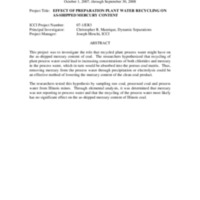EFFECT OF PREPARATION PLANT WATER RECYCLING ON AS-SHIPPED MERCURY CONTENT
Title
EFFECT OF PREPARATION PLANT WATER RECYCLING ON AS-SHIPPED MERCURY CONTENT
ICCI Project ID
07-1/ER3
Investigator
Manrique
Institution
Dynamic Separations
ICCI Abstract
Mercury occurs naturally in coal. In Illinois coal, mercury has been found to be carried by both pyrite and calcite. Calcite that appears in raw coal is generally out-of-seam floor and ceiling material that has been collected as part of the mining process. It has been shown that beneficiation of coal to remove mineral matter will also remove much of the associated mercury (Crelling, 2005).
Most coal cleaning processes at Illinois mines involve transport, classification, and separation through wet processes. The Galatia and Freeman Crown III mines, for example, each use over 13,000 gallons of water per minute in their coal washing plants. Reject water from these plants is clarified and then recycled for re-use in the plant.
The re-use of process water serves to increase the concentration of chlorides which also naturally occur in coal. During coal washing, chlorides leach from the coal into the process water. The researchers hypothesized that as coal and mineral matter are immersed in high-chloride process water, mercury chloride might be created. They further hypothesized that the concentration of this mercury chloride might increase over time until the solution reached saturation.
The porosity of coal (as measured by internal surface area) is higher in northern Illinois coal than in Southern Illinois coal (Demir, 1992). This is reflected in the inherent moisture levels of the coals as one moves north. Porous coal is able to absorb more moisture than non-porous coal through capillary action. This moisture within coal pores is not removed through conventional centrifugal drying. The investigators hypothesized that by immersion during coal preparation, the naturally occurring water in the coal matrix would be replaced with higher mercury concentration process water. If this were the case, then removal of mercury from the process water during the recycling process could increase the effectiveness that coal cleaning has on pre-combustion removal of mercury.
To test this hypothesis, the investigators obtained samples of raw coal, process water and clean coal product from two Illinois mines. The concentration of mercury in each sample was determined. Because no significant amount of mercury was found in the process water sample from either mine, the researchers determined that the initial hypothesis was disproved and the project was concluded.
Most coal cleaning processes at Illinois mines involve transport, classification, and separation through wet processes. The Galatia and Freeman Crown III mines, for example, each use over 13,000 gallons of water per minute in their coal washing plants. Reject water from these plants is clarified and then recycled for re-use in the plant.
The re-use of process water serves to increase the concentration of chlorides which also naturally occur in coal. During coal washing, chlorides leach from the coal into the process water. The researchers hypothesized that as coal and mineral matter are immersed in high-chloride process water, mercury chloride might be created. They further hypothesized that the concentration of this mercury chloride might increase over time until the solution reached saturation.
The porosity of coal (as measured by internal surface area) is higher in northern Illinois coal than in Southern Illinois coal (Demir, 1992). This is reflected in the inherent moisture levels of the coals as one moves north. Porous coal is able to absorb more moisture than non-porous coal through capillary action. This moisture within coal pores is not removed through conventional centrifugal drying. The investigators hypothesized that by immersion during coal preparation, the naturally occurring water in the coal matrix would be replaced with higher mercury concentration process water. If this were the case, then removal of mercury from the process water during the recycling process could increase the effectiveness that coal cleaning has on pre-combustion removal of mercury.
To test this hypothesis, the investigators obtained samples of raw coal, process water and clean coal product from two Illinois mines. The concentration of mercury in each sample was determined. Because no significant amount of mercury was found in the process water sample from either mine, the researchers determined that the initial hypothesis was disproved and the project was concluded.
Collection
Citation
“EFFECT OF PREPARATION PLANT WATER RECYCLING ON AS-SHIPPED MERCURY CONTENT,” ICCI Reports, accessed May 20, 2024, https://isgswikis.web.illinois.edu/icci_reports/items/show/23.
